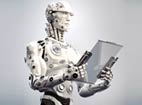In 2011, IBM Watson beat Jeopardy! champion Ken Jennings. That started the clock for the distributed, natural language processing platform. Big Blue has aggressively harnessed Watson. It is now a main part of the company’s business portfolio and marketing strategy.
It remains to be seen if AlphaGo will play the same role for Google’s DeepMind. The artificial intelligence (AI) platform celebrated a similar dramatic victory this week: It beat grandmaster Lee Sedol in a Go tournament in South Korea.
Go is a very popular chess-like game in South Korea, where this was a big deal. The silver lining to the loss was that it led to the best quote ever:
’Last night was very gloomy,’ said Jeong Ahram, lead Go correspondent for the Joongang Ilbo, one of South Korea’s biggest daily newspapers, speaking the morning after Lee’s first loss. ‘Many people drank alcohol.’
After what the victory means for DeepMind, the question is whether AI is real intelligence or just extreme number crunching. The story at New Scientist and the commentary by experts suggest that the machine displayed intuition and made moves that were “beautiful.” The thinking clearly is that DeepMind is far more than a calculator on steroids.
Far from public spectacles that lead people to drink, AI is already having an impact. Network World’s Paul Rubens outlines the ways in which AI is already being used in business. It’s more subtle than it is portrayed in movies and books. He quotes an Accenture executive as saying that AI is but another tool in the toolbox. It’s bundled into existing products.
The story deals with the issue of whether or not AI systems have intelligence – and takes a stance that would likely be argued by those who had witnessed the Go challenge:
…[I]t’s important to be clear about what AI can and cannot do. Scientists have so far made little progress in developing machines that can reason, but over the last 20 years, huge advances have been made in the AI fields of pattern recognition and machine learning.
The uses that Rubens cites are mundane, but important. Essentially, AI can detect patterns that people can’t see and dig down more quickly and accurately to learn something useful from those patterns.
Techradar Pro echoes the point that AI is very much a part of business life today. The piece, which features an interview with Sean Owen, director of Data Science at Cloudera, highlights the Amelia platform. Amelia was developed by IPsoft and, according to the story, “understands context, applies logic, infers applications and learns through experience and even senses emotions.”
Carl Weinschenk covers telecom for IT Business Edge. He writes about wireless technology, disaster recovery/business continuity, cellular services, the Internet of Things, machine-to-machine communications and other emerging technologies and platforms. He also covers net neutrality and related regulatory issues. Weinschenk has written about the phone companies, cable operators and related companies for decades and is senior editor of Broadband Technology Report. He can be reached at cweinsch@optonline.net and via twitter at @DailyMusicBrk.



